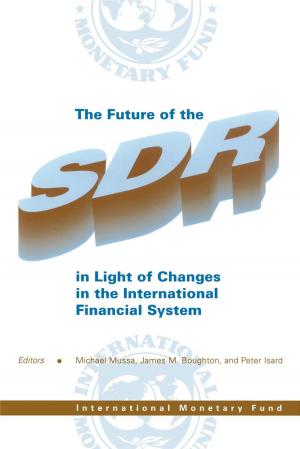The Mystery of Missing Real Spillovers in Southern Africa
Some Facts and Possible Explanations
Business & Finance, Finance & Investing, Banks & Banking, Economics, Economic Development| Author: | Olivier Basdevant, Andrew Mr. Jonelis, Borislava Miss Mircheva, Slavi Mr. Slavov | ISBN: | 9781498354349 |
| Publisher: | INTERNATIONAL MONETARY FUND | Publication: | June 4, 2014 |
| Imprint: | INTERNATIONAL MONETARY FUND | Language: | English |
| Author: | Olivier Basdevant, Andrew Mr. Jonelis, Borislava Miss Mircheva, Slavi Mr. Slavov |
| ISBN: | 9781498354349 |
| Publisher: | INTERNATIONAL MONETARY FUND |
| Publication: | June 4, 2014 |
| Imprint: | INTERNATIONAL MONETARY FUND |
| Language: | English |
Anecdotal evidence suggests that the economies of South Africa and its neighbors (Botswana, Lesotho, Mozambique, Namibia, Swaziland, and Zimbabwe) are tightly integrated with each other. There are important institutional linkages. Across the region there are also large flows of goods and capital, significant financial sector interconnections, as well as sizeable labor movements and associated remittance flows. These interconnections suggest that South Africa's GDP growth rate should affect positively its neighbors', a point we illustrate formally with the help of numerical simulations of the IMF's GIMF model. However, our review and update of the available econometric evidence suggest that there is no strong evidence of real spillovers in the region after 1994, once global shocks are controlled for. More generally, we find no evidence of real spillovers from South Africa to the rest of the continent post-1994. We investigate the possible reasons for this lack of spillovers. Most importantly, the economies of South Africa and the rest of Sub-Saharan Africa might have de-coupled in the mid-1990s. That is when international sanctions on South Africa ended and the country re-integrated with the global economy, while growth in the rest of the continent accelerated due to a combination of domestic and external factors.
Anecdotal evidence suggests that the economies of South Africa and its neighbors (Botswana, Lesotho, Mozambique, Namibia, Swaziland, and Zimbabwe) are tightly integrated with each other. There are important institutional linkages. Across the region there are also large flows of goods and capital, significant financial sector interconnections, as well as sizeable labor movements and associated remittance flows. These interconnections suggest that South Africa's GDP growth rate should affect positively its neighbors', a point we illustrate formally with the help of numerical simulations of the IMF's GIMF model. However, our review and update of the available econometric evidence suggest that there is no strong evidence of real spillovers in the region after 1994, once global shocks are controlled for. More generally, we find no evidence of real spillovers from South Africa to the rest of the continent post-1994. We investigate the possible reasons for this lack of spillovers. Most importantly, the economies of South Africa and the rest of Sub-Saharan Africa might have de-coupled in the mid-1990s. That is when international sanctions on South Africa ended and the country re-integrated with the global economy, while growth in the rest of the continent accelerated due to a combination of domestic and external factors.















